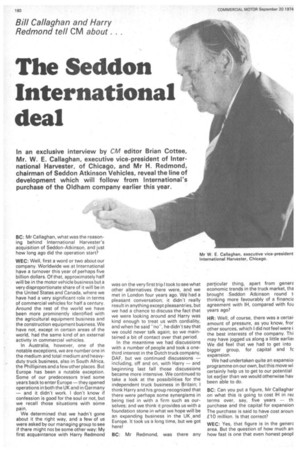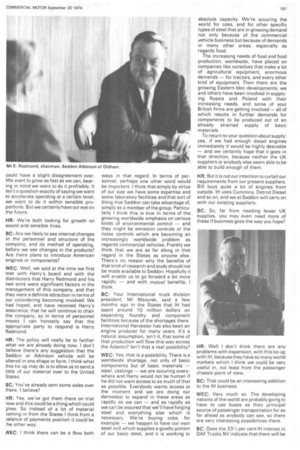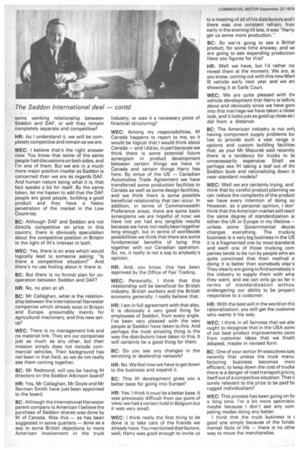The Seddon International deal
Page 182

Page 183

Page 184

If you've noticed an error in this article please click here to report it so we can fix it.
WEC: Well, first a word or two about our company. Worldwide we at International have a turnover this year of perhaps five billion dollars. Of that, approximately half will be in the motor vehicle business but a very disproportionate share of it will be in the United States and Canada, where we have had a very significant role in terms of commercial vehicles for half a century. Around the rest of the world we have been more prominently identified with the agricultural equipment business and the construction equipment business. We have not, except in certain areas of the world, had the same kind of an external activity in commercial vehicles.
In Australia, however, one of the notable exceptions, we are number one in the medium and total medium and heavyduty truck business, also in South Africa, the Phillipines and a few other places. But Europe has been a notable exception. Some of our predecessors tried some years back to enter Europe — they opened operations in both the UK and in Germany — and it didn't work. 1 don't know if confession is good for the soul or not,. but we recall those situations with some pain, We determined that we hadn't gone about it the right way, and a few of us were asked by our managing group to see if there might not be some other way: My first acquaintance with Harry Redmond was on the very f irst trip I took to see what other alternatives there were, and we met in London four years ago. We had a pleasant conversation; it didn't really result in anything except pleasantries, but we had a chance to discuss the fact that we were looking around and Harry was kind enough to treat us with cordiality, and when he said "no", he didn't say that we could never talk again; so we maintained a bit of contact over that period.
In the meantime we had discussions with a number of people and took a onethird interest in the Dutch truck company, OAF, but we continued discussions including, off and on, with Harry — and beginning last fall those discussions became more intensive. We continued to take a look at the possibilities for the independent truck business in Britain; I think Harry and his group recognized that there were perhaps some synergisms in being tied in with a firm such as ourselves; and we think it provides us with a foundation stone in what we hope will be an expanding business in the UK .and Europe. It took us a long time, but we got here!
BC: Mr Redmond, was there any
particular thing, apart from genere economic trends in the truck market, the brought Seddon Atkinson round t thinking more favourably of a financiE agreement with IH, compared with fou years ago?
HR: Well, of course, there was a certail amount of pressure, as you know, fror other sources, which I did not feel were i the best interests of the company. Thi may have jogged us along a little earliei We did feel that we had to get into bigger group, for capital and fc expansion.
We had undertaken quite an expansiol programme on our own, but this move wi certainly help us to get to our potential lot earlier than we would otherwise hay been able to do.
BC: Can you put a figure, Mr Callaghar on what this is going to cost IH in re terms over, say, five years — th purchase and the capital for expansion The purchase is said to have cost aroun L'10 million. Is that correct?
WEC: Yes, that figure is in the generi area. But the question of how much an how fast is one that even honest peopl could have a slight disagreement over. We want to grow as fast as we can, bearing in mind we want to do it profitably. It isn't a question exactly of saying we want to accelerate spending at a certain level, we want to do it within sensible proportions. But we certainly have our eye on the future.
HA: We're both looking for growth on sound and sensible lines.
BC: Are we likely to see internal changes in the personnel and structure of the company, and its method of operating, before we see changes in the products? Are there plans to introduce American engines or components?
WEC: Well, we said at the time we first met with Harry's board and with the distributors that Harry Redmond and his two sons were significant factors in the management of this company, and that they were a definite attraction in terms of our considering becoming involved. We had hoped, and have received Harry's assurance, that he will continue to chair the company, so in terms of personnel moves I can honestly say that the appropriate party to respond is Harry Redmond.
HA: The policy will really be to further what we are already doing now. I don't Delieve there's any suggestion that the Seddon or Atkinson vehicle will be 31tered in any shape or form. I think what this tie-up may do is to allow us to send a little of our material over to the United States.
BC: You've already sent some axles over there, I believe?
HR: Yes, we've got them there on trial now and this could be a thing which could row. So instead of a lot of material 3oming in from the States I think from a )alance of payments position it could be he other way.
NEC: I think there can be a flow both
ways in that regard. In terms of personnel, perhaps one other word would be important. I think that simply by virtue of our size we have some expertise and some laboratory facilities and that sort of thing that Seddon can take advantage of, simply as a member of the group. Particularly I think this is true in terms of the growing worldwide emphasis on various kinds of environmental control — and they might be emission controls or the noise controls which are becoming an increasingly worldwide problem as regards commercial vehicles. Frankly we think that we are as far along in that regard in the States as anyone else. There's no reason why the benefits of that kind of research and study should not be made available to Seddon. Hopefully it will enable us to go forward a bit more rapidly — and with mutual benefits, I think.
BC: Your International truck division president, Mr Mazurek, said a few months ago in the States that IH had spent around 10 million dollars on expanding foundry and component facilities because of the shortages there. International Harvester has also been an engine producer for many years. It's a natural assumption, isn't it, that some of that production will flow this way across the Atlantic? Isn't that a real possibility?
WEC: Yes, that is a possibility. There is a worldwide shortage, not only of basic components but of basic materials — steel, castings — we are scouring everywhere and Harry would not be human if he did not want access to as much of that as possible. Everybody wants access at the moment and we are doing our darnedest to expand in these areas as rapidly as we can — and as rapidly as we can be assured that we'll have forging steel and everything else which is necessary. We're buying coke, for example — we happen to have our own steel mill which supplies a goodly portion of our basic steel, and it is working to absolute capacity. We're scouring the world for coke, and for other specific types-of steel that are in growing demand not only because of the commercial vehicle business but because of demands in many other areas, especially as regards food.
The increasing needs of food and food production, worldwide, have placed on companies like ourselves that make a lot of agricultural equipment, enormous demands — for tractors, and every other kind of equipment. Then there are the growing Eastern-bloc developments; we and others have been involved in supplying Russia and Poland with their increasing needs, and some of your British firms are getting involved — all of which results in further demands for components to be produced out of an already strained supply of basic materials.
To return to your question about supply: yes, if we had enough diesel engines immediately it would be highly desirable — and we certainly hope that it goes in that direction, because neither the UK suppliers or anybody else seem able to be able to build enough of them.
HR: But it is not our intention to curtail our requirements from our present suppliers. Bill buys quite a lot of engines from outside. IH uses Cummins, Detroit Diesel and so on, and we at Seddon will carry on with our existing suppliers.
BC: So, far from needing fewer UK supplies, you may even need more of these if business goes the way you hope?
HR: Well I don't think there are any problems with expansion, with this tie-up with IH, because they have so many world markets which I think we could be very useful in, not least from the passenger chassis point of view.
BC: That could be an interesting addition to the IH business.
WEC: Very much so. The developing nations of the world are probably going to have to use buses as their principal source of passenger transportation for as far ahead as anybody can see, so there are very interesting possibilities there.
BC: Does the 331/2 per cent IH interest in DAF Trucks NV indicate that there will be
some working relationship between Seddon and DAF, or will they remain completely separate and competitive?
HR: As I understand it, we will be completely competitive and remain as we are.
WEC: I believe that's the right answer now. You know that some of the same people had discussions on both sides, and I'm one of them. But we are in a much more major position insofar as Seddon is concerned than we are as regards DAF. And human nature being what it is, that fact speaks a bit for itself. By the same token, let me hasten to add that the OAF people are good people, building a good product and they have a heavy penetration of the market in the Low Countries.
BC: Although DAF and Seddon are not directly competitive on price in this country, there is obviously speculation about the competitive position in Britain in the light of IH's interest in both.
WEC: Yes, there is an area which would logically lead to someone asking: "Is there a competitive situation?" And there's no use fooling about it: there is.
BC: But there is no formal plan for cooperation between Seddon and DAF?
HR: No, no plan at all.
BC: Mr Callaghan, what is the relationship between the International Harvester companies which already exist in Britain and Europe, presumably mainly for agricultural machinery, and this new setup?
WEC: There is no management link and no material link. They are our companies just as much as any other, but their mission simply does not include commercial vehicles. Their background has not been in that field, so we do not really see them coming together.
BC: Mr Redmond, will you be having IH directors on the Seddon Atkinson board?
HR: Yes, Mr Callaghan, Mr Doyle and Mr Norman Smith have just been appointed to the board.
BC: Although the International Harvester parent company is American I believe the purchase of Seddon shares was done by IH of Canada. Was this — as has been suggested in some quarters — done as a sop to some British objections to more American involvement in the truck industry, or was it a necessary piece of financial structuring?
WEC: Among my responsibilities, IH Canada happens to report to me, so it would be logical that I would think about Canada—and I did so, in part because we think there is some 'potential future synergism in product development between certain things we have in Canada and certain things Harry has here. By virtue of the US — Canadian Automotive Trade Agreement we have transferred some production facilities to Canada as well as some design facilities, and we think there is some possible beneficial relationship that can Occur. In addition, in terms of Commonwealth Preference areas, there are some basic synergisms we are hopeful of now; we have not yet had any tangible results because we have not really been together long enough, but in terms of worldwide possibilities we think that there are some fundamental benefits of tying this together with our Canadian operation. So, no, it really is not a sop to anybody's opinion.
HR: And, you know, this has been approved by the Office of Fair Trading.
WEC: Personally, I think that this relationship will be beneficial for British industry, British workers and the British economy generally. I really believe that.
HR: I am in full agreement with that also. It is obviously a very good thing for employees of Seddon, from every angle. I've been very pleased with the way people at Seddon have taken to this. And perhaps the most amazing thing is the way the distributors have taken to this. It will certainly be a good thing for them.
BC: Do you see any changes in the servicing or dealership network?
HR: No. We feel now we have to get down to the business and expand it.
BC: This IH development gives you a better base for going into Europe?
HR: Yes. I think it must be a better base. It was previously difficult from our point of view; we had a certain hold in Belgium but it was very small.
WEC: I think really the first thing to be done is to take care of the friends we already have. You mentioned distributors; well, Harry was good enough to invite us to a meeting of all of hisdistributors and i' there was one constant refrain, frorr early in the evening till late, it was "Harry get us some more production."
BC: So we're going to see a Britist product, for some time anyway, and Wf are going to see expanding production Have you figures for this?
HR: Well we have, but I'd rather no reveal them at the moment. We are, a! you know, coming out with this new Marl Ili vehicle early next year and we arE showing it at Earls Court.
WEC: We are quite pleased with th! vehicle development that Harry is talkinc about and obviously since we have gom into this marriage we have taken a close look, and it looks just as good up close as i did from a distance.
BC: The American industry is not onl) having component supply problems bu. has to provide such a vast range a options and custom building facilities that, as your Mr Mazurek said recently there is a tendency for trucks to bE unnecessarily expensive. Shall wE perhaps see IH taking a leaf out of thE Seddon book and rationalizing down tc near-standard models?
WEC: Well we are certainly trying, and think that by careful product planning WE can reduce the complexity of the product we have every intention of doing so However, as a personal opinion, I don' think that the American market will react the same degree of standardization a! either the UK or Europe in my lifetime — unless some Governmental decreE changes everything. The truckinc business is a very big business in the US it is a fragmented one by most standarth and each one of those trucking corn panies tends to be run by people who ar! quite convinced that their method o doing it is better than somebody else's They clearly are going to find somebody ir the industry to supply them with wha they want, and we can only go so far ir terms of standardization withou endangering our ability to be properh responsive to a customer.
HR: With the best will in the world on thi! rationalization, you still get the customel who wants it his way.
WEC: I think in all fairness that we a Is( ought to recognize that in the USA sorm of our best product improvements cam from customer ideas that we finall) adopted, maybe in revised form.
BC: One of your senior IH executives saic recently that unless the truck manu facturing business becomes morE efficient, to keep down the cost of trucks there is a danger of road transport pricinc itself out of a competitive situation. That i! surely relevant to the price to be paid fol rugged individualism?
WEC: This process has been going on fol a long time. I'm a bit more optimistic maybe because • I don't see any com peting modes doing any better.
i think that the truck business is E good one simply because of the funda mental facts of life — there is no othel way to move the merchandize.




































































































































































































































































































































































